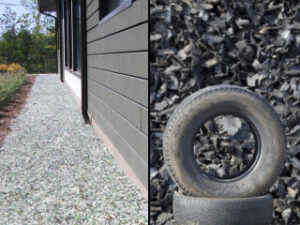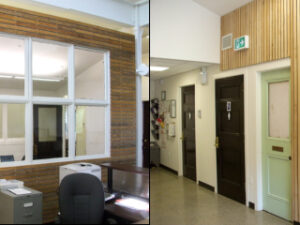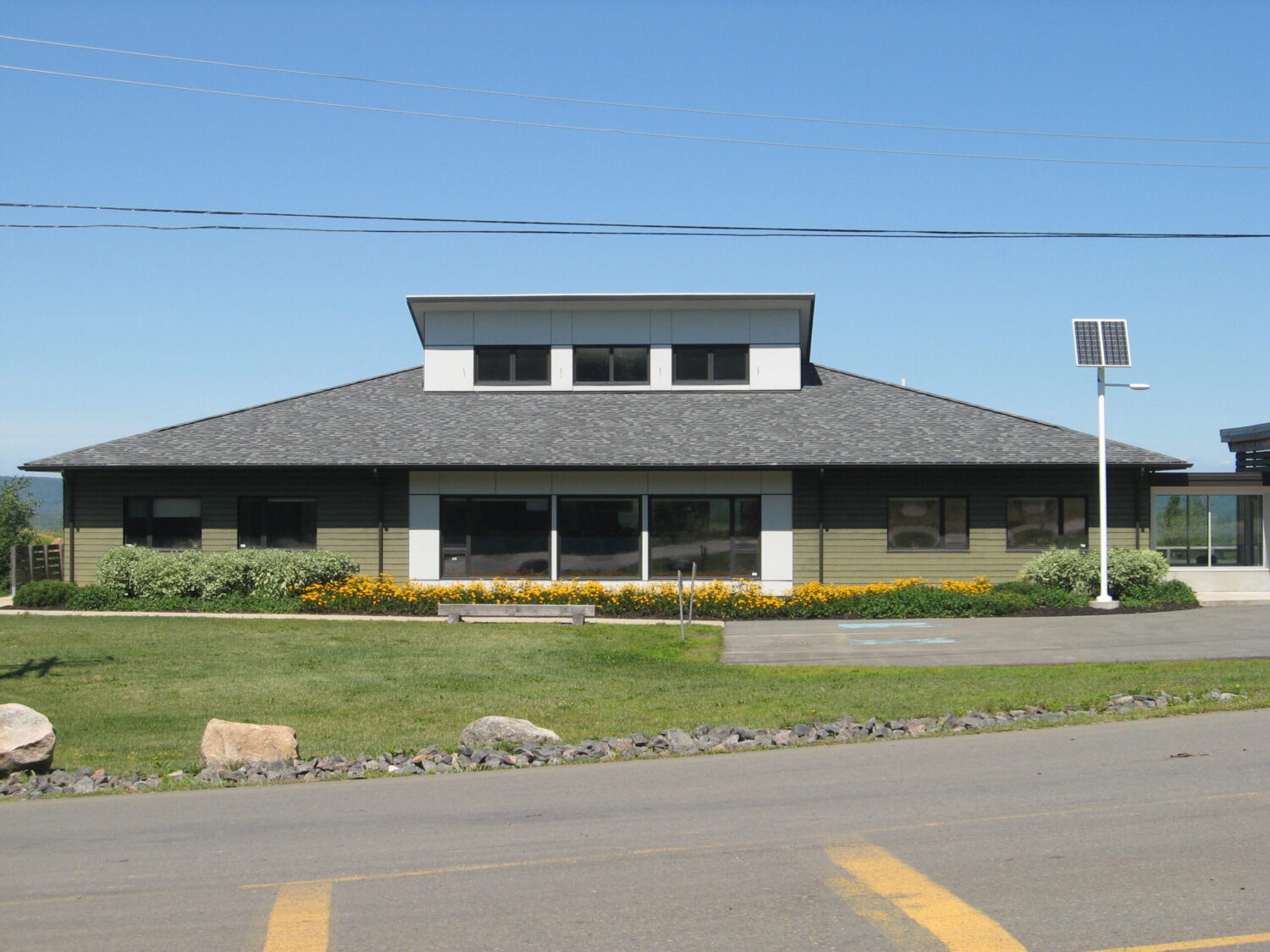Partners in Waste Reduction
The provision of an equal level of service on a Region-wide basis based on the following goals
Environmental Soundness
Social Acceptance
Fiscal Responsibility
Purpose & Values
Meeting the Highest Standards
Valley Waste’s administration building was one of the first commercial buildings in Canada to be accredited for both LEED Gold and Passive House certifications.
Superinsulation
To meet the Passive House standards, the building was designed to be super insulated and made airtight from top to bottom.
- R-96 roof is insulated with 8,000 cubic feet of Thermo-Cell cellulose insulation – made in Debert, NS from recycled newsprint.
- R-50 walls are insulated using Structural Insulated Panels
- R-34 foundation walls were achieved with Insulated Concrete Forms
- R-27 insulated slab & footings
Recycled Materials
 Recycled materials were used throughout the building for both practical and decorative purposes:
Recycled materials were used throughout the building for both practical and decorative purposes:
- Recycled window and bottle glass was added to the polished concrete floors to replace aggregate and enhance the beauty of the floor.
- Recycled bottle glass was included in the south facing flower beds to encourage drainage.
- The administrative building was one of the first commercial buildings in Canada to use Tire Derived Aggregate as both insulation and drainage around the foundation.
- Roadways and parking areas contain recycled asphalt and/or recycled roofing shingles in its mix.
- Outdoor furniture made from recycled post-consumer plastic bags and reclaimed timber.
Reused Materials
 Reuse is an essential component of waste reduction and played a major role in the interior finish of the building:
Reuse is an essential component of waste reduction and played a major role in the interior finish of the building:
- Decorative wood paneling salvaged from the hardwood flooring of St. Lawrence Church annex in Halifax;
- Interior office windows were reclaimed from houses throughout Nova Scotia.
- Interior doors reclaimed from a demolished Odd Fellows hall in Halifax;
Company History
Valley Waste is one of seven solid waste regions in the Province that were formed to work toward waste diversion and prevention on a regional basis allowing for economies of scale and increased financial viability of recycling and composting in Nova Scotia.
Solid waste management was at a crisis in most areas of the province
Consultation
Solid Waste Strategy
Valley Waste begins operations
Waste Management Authority Board
The Valley Region Solid Waste-Resource Management Authority is a body corporate formed under an Inter-Municipal Services Agreement encompassing the Municipality of the County of Kings, and the Towns of Annapolis Royal, Berwick, Kentville, Middleton and Wolfville.
The Authority is a legally formed body comprised of representatives from each of the six participating municipal units and meets on a monthly basis to discuss issues and provide a basis on which staff manages the business of the authority.
The Valley Waste board and staff are committed to a safe workplace and have put a safety policy in place which is regularly reviewed and updated by the Occupational Health and Safety Committee.
Authority Board Members
- Dave Corkum (Mayor) Chair Municipality of the County of Kings
- Andrew Zebian (Mayor) Town of Kentville
- Jodi MacKay (Mayor) Vice Chair Town of Wolfville
- Mike Trinacty (Mayor) Town of Berwick
- Gail Smith (Mayor) Town of Middleton
- Amery Boyer (Mayor) Town of Annapolis Royal
Waste Management Authority Minutes
- 2024-2025 Signed Audited Statements
- 2023-2024 Signed Audited Statements
- Audited Statements for year ending March 31, 2023
- Audited Financial Statements March 31, 2022
- Operating Budget for 2021-2022
- Operating Budget for 2020-2021 (PDF)
- Operating Budget for 2019-2020 (PDF)
- Audited Financial Statements March 31 2021
- Audited Financial Statements March 31 2020
- Consolidated Financial Statements for 2018-2019 (PDF)
- Audited Financial Statements for 2017-2018 (PDF)
- Audited Financial Statements for 2016-2017 (PDF)
April 10, 2024 Final IMSA Special Board Meeting Minutes
April 17, 2024 Final IMSA Board Meeting Minutes
May 15, 2024 Final IMSA Board Meeting Minutes
May 28, 2024 Final IMSA Special Board Meeting Minutes
June 12 2024 Approved IMSA Special Board Meeting Minutes
June 19 2024 Approved IMSA Board Meeting Minutes
July 17 2024 Final IMSA Board Meeting Minutes
October 16 2024 Final IMSA Board Meeting Minutes
November 20, 2024 Final IMSA Board Meeting Minutes
December 18, 2024 Final IMSA Board Meeting Minutes
January 15, 2025 Final IMSA Board Meeting Minutes
Minutes 2021-2022
April 21, 2021 Final Authority Meeting Minutes
May 19, 2021 FINAL Authority Meeting Minutes
June 16, 2021 Final Authority Meeting Minutes
July 21 2021 Final Authority Meeting Minutes
September 15, 2021 FINAL Authority Meeting Minutes
October 20, 2021 FINAL Authority Meeting Minutes
November 17, 2021 Final Authority Meeting Minutes
December 22 2021 Final Authority Meeting Minutes
January 19, 2022 Final Authority Meeting Minutes
Minutes 2018 - 2019
Minutes 2017-2018


